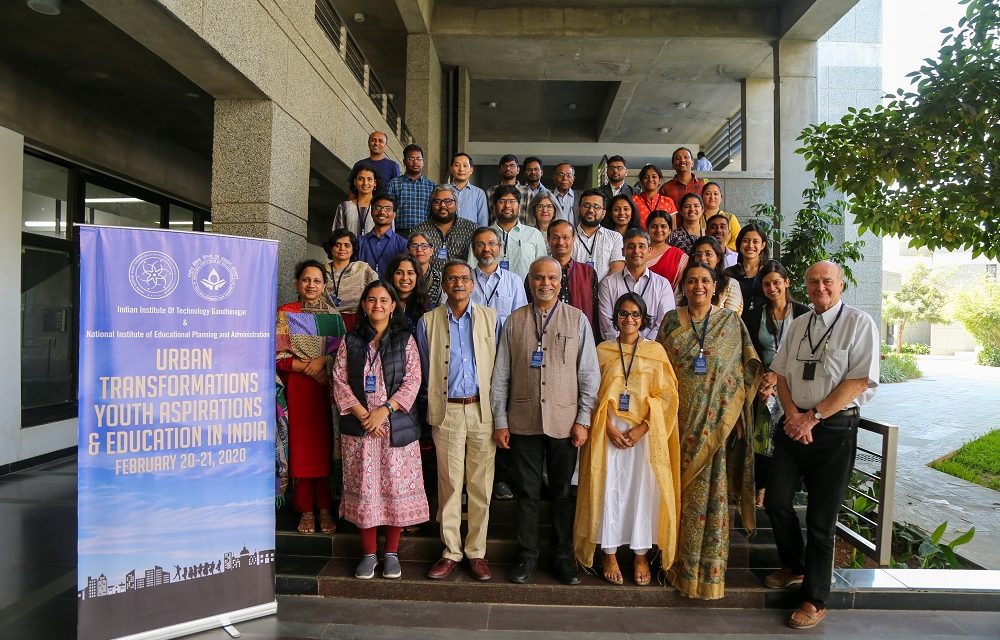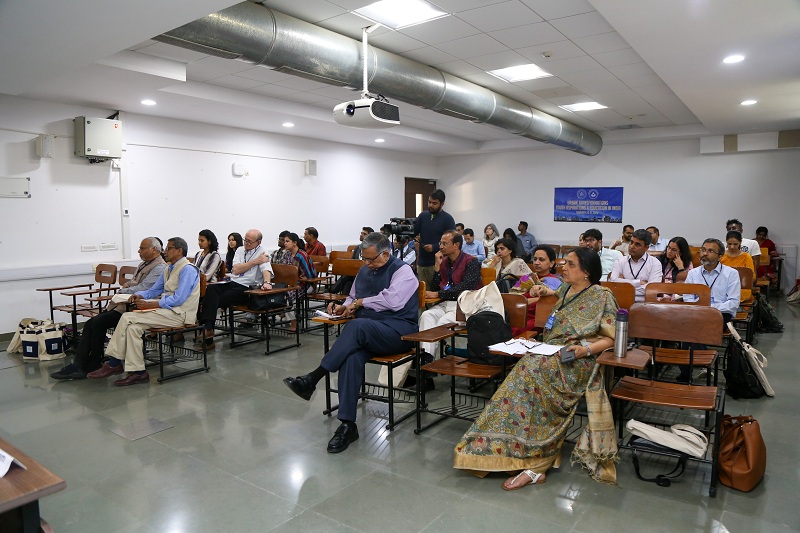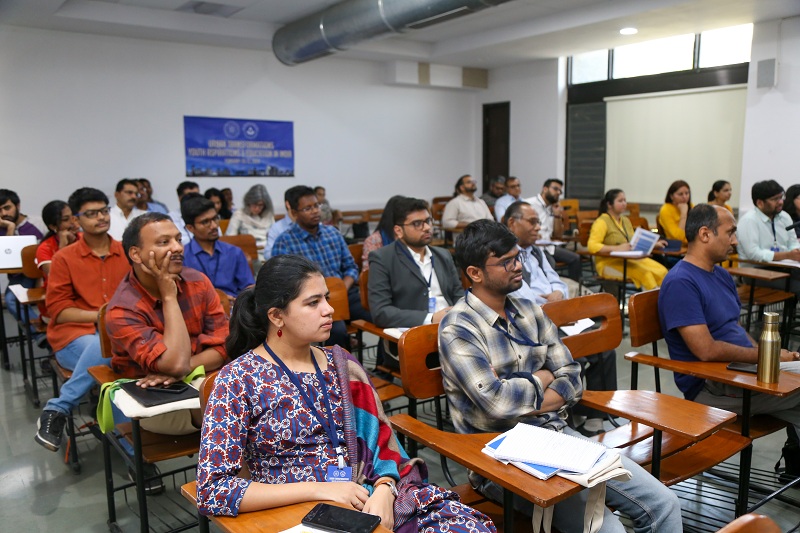A two-day conference on ‘International Conference on Urban Transformations, Youth Aspirations and Education in India’ was inaugurated today at the Indian Institute of Technology Gandhinagar (IITGN). It is jointly organised with the National Institute of Educational Planning and Administration (NIEPA), New Delhi, to expand an inter-disciplinary dialogue on various facets of education and the youth in India with respect to rapid urban transformations.
Prof Mona Mehta, IITGN and Prof Manisha Priyam, NIEPA, the co-organisers of the workshop along with Prof Divya Vaid from JNU, gave a background of the conference. In an age and stage of transition as one of the youngest nations in the world and when the technology inspired transformation of the economy, workplace, education, and communications have significant implications on youth lives and culture, India should become the world leader in understanding how we understand our own youth as agents of transformations.
The conference kick-started with a thought-provoking Inaugural Panel on Education with Dr Bhushan Patwardhan, Vice Chairman, University Grants Commission (UGC), New Delhi, and Chief Guest of the conference; Prof Pankaj Chandra, Vice Chancellor, Ahmedabad University; and Prof Sudhir Jain, Director, IIT Gandhinagar.
Prof Bhushan Patwardhan highlighted the two of the several initiatives taken by UGC – 1) National Academic Credit Bank, which will essentially allow students to open an account in this virtual knowledge bank of courses to start learning much earlier than entering a college. Students from anywhere in the world will be able to use this. Currently this idea is in the process of getting it regulated. 2) Semester Outreach Program, a structured credited program to allow students aspirations to flourish in education. It will be a kind of NCC 2.0 and NSS 2.0 to retrieve the original spirit of these programs and which will enable students to learn from the community, as learning doesn’t happen only in classrooms. It will let urban students go to rural areas and rural students go to urban areas, live there for one month, know their lifestyles. Students and their moral values will change automatically. “Networking within students is also very important. They can learn from each other and help each other. This semester course will give an opportunity to students to go out of their routine classrooms and do something that they like and aspire for. Classrooms must have multi-way learning experience rather than a one-way monologue from the teachers. We must cement the divide between the urban and the rural.”
We have made a major divide between white-collar and blue-collar jobs and there is no reason why it should be. Rural youth come to urban areas mainly with an aspiration to get a stable job, but it is not their real aspiration. Real aspirations come out only when you talk to them, but we don’t even sense those aspirations in our current education system. The basic aim of education is to make students inquisitive, but we don’t allow them to think at all in the current system of education.
Prof Bhushan PatwardhanNext, Prof Pankaj Chandra spoke about three points – 1) What forces are driving changes in student behaviour today, 2) Student centricity, and 3) Universities in the cities. Elaborating on these he said, “Demographics, Technology, Urbanisation, and Climate Change, these four major forces are transforming the society and institutions in a big way and all of them have a role to play in how we craft our education system. As academics and educational institutions, we must not separate ourselves from this larger force of society. Employability is creating anxiety among students and their parents. To a large number of young people, technology has moved away from being a source of knowledge to being a source of entertainment. That is distracting them from creating a purpose for themselves. Immense in-migration into the cities and coming in touch with the urban youth with a different kind of sensibilities, is creating an add-mixture of immense confusion in the minds of young people. Institution’s role is to create multiple lenses for these young people through which they can see the society, which is a big challenge. The ideal duration and location of the term need to change, we haven’t done enough thinking on how and when institutions must be run to facilitate the climate.”
Talking about the next two points Prof Chandra added, “We don’t pay enough attention to how to put students as the core of the institutional enterprise. The students of today are very different in terms of their socialisation, conversation, the language they use, motivation and so on. Unless we understand their minds, make them engage with issues of the time, various theories and ideas, I don’t think we can become student centric. Universities in the cities should be able to create new pathways. The youth of today want to learn things here and now and that is an amazing blessing. The cities provide fabulous learning laboratories, as it is accessible, it has challenges for a class project. As soon as we start seeing a city as a lab, our ability to engage with this youth increases dramatically.”
Prof Sudhir Jain focused on three points in his speech – 1) Employability of young people, 2) Curriculum of the universities, and 3) The culture in our institutions. He said, “If we have to look at our youth and its employability, we must realise that something basic is lacking in our youth today and we must take responsibility for it as educational institutions. What is lacking greatly is integrity in everything we do, if you bring it into our universities/institutions, our youth will become employable. The challenge about the current educational curriculum is it doesn’t prepare an individual for independent comprehension, problem-solving, thinking and learning. IITGN has tried to solve this to a large extent through various programs such as Foundation Program, Explorer Fellowship, Writing Studio and so on. We need to look at how we deal with our students and create an environment of mutual trust and accountability. The third idea of creating an institutional culture is also very important. There is no uniformity in values and culture among institutions and it creates confusion among students and faculty. We need to think deeper about how we are running our institutions.”
The inaugural panel was followed by three engaging sessions on ‘Educational Conundrums of Indian Youth’; ‘Youth and Political Mobilisation’; ‘Studying the Youth: Methods and Approaches’ and the Keynote Lecture by Prof Craig Jeffrey, Professor of Geography at the University of Melbourne, Australia and Director, Australia India Institute, on “Fresh Contact: Empowering Youth Innovators in South Asia”. The first day of the conference also screened a short film screening titled – ‘Lifelines: documenting social change in the Indian Himalayas’ by Jane Dyson, Professor Anthropology at the University of Melbourne.
Second day of the conference had more sessions on ‘Peri-urban/Small Town Youth Aspirations’; and ‘Urban Landscapes: Marginality and Circulation’, and the second Keynote Lecture by Prof John Harriss, Professor Emeritus of International Studies, Simon Fraser University, Canada, titled “Aspiration, Opportunity, Mobility: the prospects for development among India’s youth”.
This news was covered by some of the leading Indian newspapers and media agencies. Click on the links below to read more.




